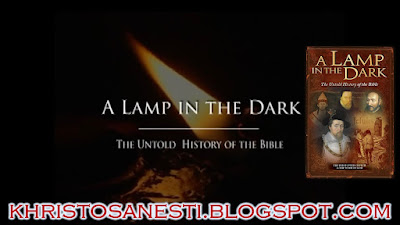PART I : A LAMP IN THE DARK
This exciting documentary unfolds the fascinating "untold" history of the Bible, revealing critical information often overlooked in modern histories. Enter into a World of saints and martyrs battling against spies, assassins and wolves in sheep's clothing. Learn the stories of valiant warriors of faith, such as John Wycliffe, William Tyndale, Martin Luther, the ancient Waldenses, Albigenses, etc.
Director: Christian J. Pinto
Writer: Christian J. Pinto
Stars: David Brown, Kirk Divietro, Jack Moorman
PART II : TARES AMONG THE WHEAT
The sequel to "A Lamp in the Dark". Tares Among the Wheat will likely challenge what most scholars believe about Bible history, and the origins of modern Textual Criticism. In the 19th century, a revolution in biblical scholarship was prompted by the publication of a never-before-seen manuscript called Codex Sinaiticus. The work was discovered by a German scholar named Constantine von Tischendorf, who declared it to be the oldest Bible ever found. Yet shortly after his discovery was published, a renowned Greek paleographer named Constantine Simonides came forward and declared that the manuscript was no ancient text at all, but had been created by him in 1840. The controversy surrounding these events is, perhaps, the most incredible untold chapter in Bible history. It involves the Jesuits, the Pope, a high-minded German, a collection of Anglo-Catholics, and a mysterious Greek patriot. It is a story that (while quite true and well documented) a vast majority of modern academics know nothing about. Yet the subject matter dramatically impacts the world's understanding of biblical scholarship to this day, and the footnotes in your Bible are the proof of it.
http://www.adullamfilms.com/TaresAmon...
PART III : BRIDGE TO BABYLON (ROME, ECUMENISM & THE BIBLE)
Synopsis: In 1881, two scholars named Westcott and Hort published a revision of the New Testament that would send shockwaves through the academic world. Their new textual theory declared that the King James Version (which had been trusted for centuries) was full of errors. Sacred readings, long cherished by the faithful, were now declared to be forgeries. The world was informed that the book, which had been called the inerrant Word of God, was in need of correction. The new theory claimed that recently recovered manuscripts revealed a truer version of Scripture. Yet others warned that these manuscripts were, in fact, the creation of early Gnostic heretics that had been rightly abandoned centuries before. Was the new revision filled with ancient corruptions? Follow the story of the Bible’s controversial history into the twentieth century, as the work of Westcott and Hort would transform biblical scholarship, inspire the work of various Bible Societies, and pave the way for the cause of ecumenical unity between Evangelical Protestants and Rome.
Information covered in this documentary:
1) The history of the Revision of the Bible in 1881.
2) The objections of Dean John W. Burgon concerning the “new Greek text” invented by Anglican scholars, B.F. Westcott and F.J.A. Hort.
3) The analysis of George Sayles Bishop, R.L. Dabney and William G. Blaikie who likewise opposed the Revision of Westcott and Hort in the 19th century.
4) Proof that the purpose of the Revision was to overthrow the Received Text of the Protestant Reformation.
5) The warnings of Dr. F.H.A. Scrivener who declared that the theory behind the new Greek text was based on conjecture and fantasy.
6) The “Romish” doctrines of Westcott and Hort, as revealed in their letters, along with admissions of willful deception and heresy.
7) The warnings of early Church fathers concerning the corruptions of Gnostic heretics who altered ancient manuscripts in the early centuries.
8) Examples from the Critical Text of what are believed to be Gnostic influences that currently influence the majority of modern bibles.
9) How the work of Westcott and Hort was transformed into the Nestle-Aland Greek text, used by the vast majority of Bible colleges and universities, as well as most Bible translations.
10) The beliefs of Dr. Kurt Aland (the chief influence behind the Nestle-Aland Greek text) who denied the apostolic authorship of the New Testament, and suggested that Jesus may have been a mere “phantom.”
11) The influence of Dr. Bruce Metzger, a leading Bible critic of the 20th century (who worked on the RSV and NRSV translations) and his denial of the authorship of Moses in the Old Testament.
12) The influence of William Cameron Townsend, founder of Wycliffe Bible Translators, and Dr. Eugene Nida, father of the dynamic equivalence method of Bible translation (i.e. paraphrase).
13) The development of “bridge bibles” and what they mean.
14) The discovery of the Bodmer Papyri by a Jesuit priest.
15) Proof that the discovery of the Bodmer Papyri is associated with ancient Gnostic groups from the Nag Hammadi region of Egypt.
16) The influence of Rome, her Jesuits, and the ecumenical movement in the development of a single Greek text, as the “one world Bible” to unify all churches.
17) Discussion with Dr. James White (author of The King James Only Controversy) concerning his defense of the Critical Text and modern versions in general.
Featured Speakers: Dr. Phil Stringer, Dr. David Brown, David Daniels, Dr. D.A. Waite, Dr. Jack Moorman, Dr. Kirk DiVietro, Dr. H.D. Williams, Dr. Ronald Cooke & Dr. James R. White.
Bridge To Babylon is the sequel to 'A Lamp in the Dark' and 'Tares Among The Wheat' from The Untold History Of The Bible documentary series.
+++






